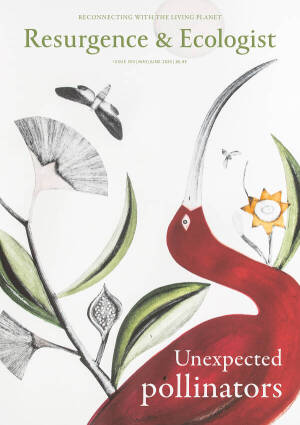Rupert Read and Morgan Phillips bring us an insightful and timely collection of essays on the world’s pressing need for transformative adaptation. Their book came out at an important moment: the planet has breached the 1.5C temperature limit set out in the Paris Agreement, and Donald Trump has re-entered the White House with a new zeal to resile from climate action, and “drill, baby, drill.” In keeping with the times, the book sets out a bracing, alternative vision of the way forward – rooted in action on the ground, communities, direct action, and new efforts to broker greater democracy and civic engagement. It finds patterns in the response in the US to the Los Angeles fires and Trump’s early actions, with a resurgence of civic action and community-led activism across the country.
Over a series of chapters, Read and Phillips describe the challenges of where we are now and show how there is still a chance that the world can put things right. How we can transition to a new system in which we live in harmony with Nature and keep the worst of an unravelling climate at bay. Written before the result of the US election, there is little that one would update in its aftermath – all the central prescriptions still stand, but they speak with a heightened sense of urgency.
The book is wide-ranging. Read sets the context in an opening chapter on ‘A Moment of Criticality’; Phillips and Read then describe ‘The Age of Adaptation’, before Read explains what ‘Transformative Adaptation’ really is: adaptation grounded in systems change and “major psychological adjustments away from what has been ‘normal’”. No tinkering at the edges here: only a whole change in the way we live will enable us to withstand the coming decades and forge a way through.
The second half of the book is more focused on practical action. There is a chapter on agroforestry as one example of transformative adaptation. It is inspiring to learn that in northern Syria (“or southern Kurdistan”) the community has built a Make Rojava Green Again movement. Perhaps many more countries could have such hubs in a time of climate crisis, as well as building broader climate hubs such as those I have seen emerging in communities in Sussex – people gathering and working to make common cause on climate.
In a later chapter, Read criticises the COP process for its record of failure and a history of broken promises, using the word ‘nemesis’ to describe the endless recycling of the promise to “keep 1.5 alive”. While I agree that COPs have become too big, with far too many attendees, I also agree with the UK Special Representative for Nature, Ruth Davis, who spoke recently at Kew Gardens about the value of COPs as a global meeting point where all have a voice, and of how much more extreme the climate would already have become without the Paris Agreement.
Where, then, does the solution lie? Read and co-authors coalesce in a series of concluding chapters around the need for community climate action, for “transformative learning for transformative adaptation”, for education and a focus on the classroom (a fascinating and heartfelt chapter), for permaculture and for democratic renewal. The final chapters are close in sentiment and ideas to many Resurgence readers’ hearts, and perhaps this is indeed the future of the world as we know it, at a time of breakdown. The authors conclude with a lucid declaration for transformative adaptation.
I was left wondering, however, whether the action on the ground the book calls for might still be backed by a new multilateral coalition of the willing working together at the global level. And whether this work together in a spirit of mutuality and shared understanding among nations of goodwill might be the necessary foil to a new groundswell of community-led action in every country and landscape on Earth.
Transformative Adaptation: Another World Is Still Just Possible by Rupert Read and Morgan Phillips, with Manda Scott. Permanent Publications, 2024. ISBN: 9781856232258






